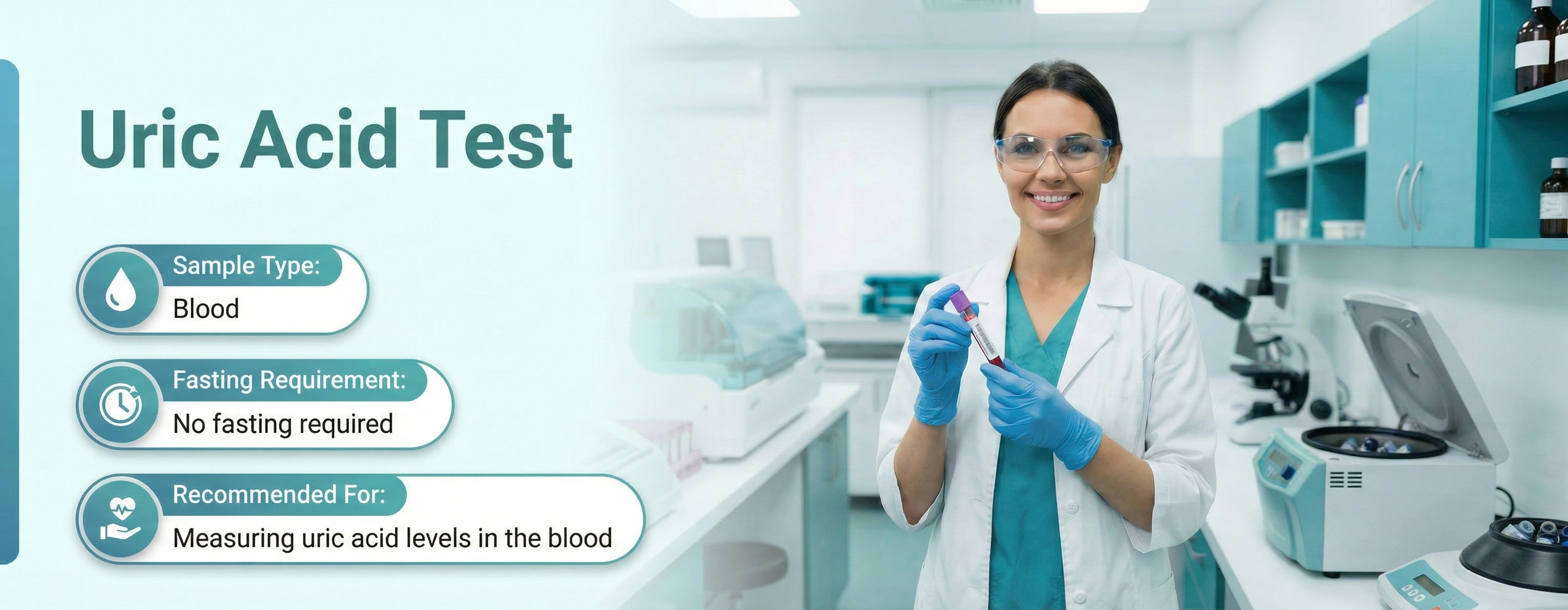498+ orders placed in your location
100% NABL & ISO Certified Lab • 100% Accurate Reports
Rheumatoid Factor (RA) Test- Quantitative
RA Quantitative
- SummaryThe RA (Rheumatoid Factor) test measures the level of rheumatoid factor antibodies in the blood, often used to help diagnose rheumatoid arthritis and other autoimmune disorders. This test is done by taking a blood sample from a vein in your arm, and fasting is not required for this test. Read more
- Reports Within23 HrsView Sample Report100% NABL & ISO Certified Labs
- SampleBlood
- AgeAll Age Group
- GenderMale and Female
- FastingNot Required
PharmEasy Promises
Know More About The Test
A quick info on RA Factor test
Overview
A healthy immune system is vital to the functioning of the human body. The immune system protects the body against disease-causing microorganisms. However, immune deficiency diseases decrease the body’s ability to fight invaders, causing vulnerability to infections. In response to an unknown trigger, the immune system may begin producing antibodies that, instead of fighting infections, attack the body's tissues.
One such autoimmune disease is Rheumatoid Arthritis. It is caused by the presence of the rheumatoid factor, which is an autoantibody produced by the immune system. Rheumatoid Arthritis is a systemic autoimmune disease that is chronic (for a long time). It causes inflammation, stiffness, pain and gradually causes permanent joint damage. Usually, it occurs after the age of 40 years. Women are more prone to be affected by it as compared to men.
A doctor may recommend the Rheumatoid Factor (RA) quantitative test if a patient is showing symptoms of Rheumatoid Arthritis. RA quantitative test detects the level of rheumatoid factor in the blood, which aids in diagnosing autoimmune diseases such as Rheumatoid Arthritis. If the X-ray of the patient shows swelling in the joint capsules along with the loss of cartilage and bone, an RF test is advised.
Risk Assessment
Rheumatoid Arthritis, Lupus Erythematosus, Sjogren's Syndrome, Chronic Infections
What does this test detect?
The rheumatoid factor quantitative test measures the amount of RF present in the blood vessels.
Higher RF levels may be found in the patient due to the above diseases, but the final diagnosis of which disease the patient has contracted is made through various tests and clinical examination of the individual by the physician or rheumatologist. The normal range of RF differs between different genders and various ages, so only a proper medical diagnosis can provide a definite answer to what the issue is.
Constant testing of the rheumatoid factor is not necessary as it is only recommended by medical professionals when the symptoms of an autoimmune disease show up in the patient.
Indications for Rheumatoid Factor Test
The following symptoms prompt the consulting physician to prescribe you for a rheumatoid factor test along with other blood tests:
- Joint pain
- Joint stiffness
- Joint swelling
- Fatigue
- Low-grade fever
- Nodules under the skin
- Loss of range of motion
- Bone loss
- Loss of cartilage
- Dry mouth and eyes
The symptoms of the following diseases might warrant a rheumatoid factor test:
- Lupus
- Cancer
- Rheumatoid arthritis
- Sjörgen syndrome
- Inflammatory lung diseases
- Chronic infections
- Autoimmune disorders
How frequently should you take this test?
A Rheumatoid Factor quantitative test should be taken only when advised by your doctor. It is not a test that has to be done at regular intervals. If a patient shows symptoms of increased Rheumatoid factor, it is suggested to get a Rheumatoid Factor quantitative test done. This test is generally advised along with other tests to better understand the autoimmune disease in the body.
Test Preparation
Before the Test
This is a very simple test; hence there is no preparation required for the same.
During the Test
The procedure for sampling blood for a rheumatoid factor quantitative test is similar to other general blood tests. A Phlebotomist collects the blood from the vein of the arm into a vial through a sterilised needle. This process barely takes 5 minutes.
After the Test
Like any other blood test, after the sample is taken, the point of contact is cleaned and pressure is applied on the spot to stop any bleeding. There is no risk from this test and post-test restrictions.
Parameters
The rheumatoid factor quantitative test only indicates the levels of RF present in the body. This test, coupled with other tests, helps in the diagnosis of autoimmune diseases. The result of the rheumatoid factor quantitative test is reported as titer, which is a measurement of how much your blood can be diluted before RF antibodies are undetectable.
Although, the results of the rheumatoid factor quantitative test alone is not an absolute indicator of a disease present in the body as an individual can have high RF levels but still be healthy and vice versa.
Ranges
|
Ranges |
Quantity (Iu/ml) |
|---|---|
|
Normal |
< 18 IU/mL |
|
Elevated or high |
> 18 IU/mL |
- The normal range depends on the age of the individual.
- Elevated RF levels might not necessarily prove the presence of an autoimmune disorder.
The normal values and reference ranges of the test may vary from lab to lab. Please refer to the ranges mentioned in the report and consult a doctor to understand the interpretation of lab reports.
Test Result Interpretation
The rheumatoid factor quantitative test is generally classified as positive or negative depending upon the levels. If the level is within the normal range, the result comes out as negative, whereas, in an elevated range case, the result comes out positive. The range of RF factors also varies from laboratory to laboratory and is also dependent on the method through which the test is performed.
If the result of the rheumatoid factor test is in the elevated range, it could be the indicator of an autoimmune disease such as rheumatoid arthritis and Sjorgen’s syndrome. Higher the level of rheumatoid factors present in the body, the higher the chance of having an autoimmune disease. It is best to get the report studied by a rheumatologist for accurate diagnosis.
A positive RF test can indicate the presence of the following disorders:
- Sjogren’s syndrome
- Systemic Lupus
- Inflammatory lung disorders
- Cancer
- Connective tissue diseases
The results of rheumatoid factor testing help the physician diagnose and pinpoint the reason for the elevated RF levels. While having a higher RF points towards a higher chance and severity of an autoimmune disease, having a low RF doesn’t rule out the possibility of an underlying health issue. Rheumatoid arthritis is the most common disease for which rheumatoid factor quantitative test is prescribed along with other tests such as:
- CCP antibody test
- ANA testing
- Synovial fluid analysis
- Erythrocyte sedimentation rate
- CRP test
People of older age tend to have higher RF levels as their body loses mobility with time. People between the age of 60 to 80 are found to have high RF levels. They tend to be at a higher risk of autoimmune diseases like rheumatoid arthritis.
Along with the above-mentioned tests, a physical exam and a diagnosis of the symptoms are made to get a better idea of the issue at hand. An even better option is to consult a rheumatologist as they are the experts in diagnosing autoimmune diseases and RF-related health issues. They can better analyse the patient’s condition and assist through treatment and recovery.
Price/Cost
Depending on the city and the lab, the cost of an RA Factor test can differ. Generally, the price for an RA Factor test ranges from INR 409 to INR 939. Here's a breakdown of the average expenses for an RA Factor test in several key cities in India:
City | Min Price | Average Price | Max Price |
RA Factor Test Price in Bengaluru | 409 | 674 | 939 |
RA Factor Test Price in Chennai | 409 | 674 | 939 |
RA Factor Test Price in Delhi | 409 | 674 | 939 |
RA Factor Test Price in Hyderabad | 409 | 674 | 939 |
RA Factor Test Price in Kolkata | 409 | 674 | 939 |
RA Factor Test Price in Lucknow | 409 | 674 | 939 |
RA Factor Test Price in Mumbai | 409 | 674 | 939 |
RA Factor Test Price in Nagpur | 409 | 674 | 939 |
RA Factor Test Price in Patna | 409 | 674 | 939 |
RA Factor Test Price in Pune | 409 | 674 | 939 |
Risks and Limitations
The rheumatoid factor quantitative test t is a common blood test with a very low risk of complications. Seek medical advice right away if you notice-
- Excessive bleeding following the needle insertion.
- Discomfort or swelling at the insertion site.
Limitations of the test
- Negative impact on the outcome of the test due to equipment or human errors.
- Wrong understanding of the markers.
Was This Test Information Helpful?
Please rate your experience
References
People Also Ask
What causes the RA factor to be high?
What are the symptoms of the high RA factor?
What foods are bad for rheumatoid arthritis?
How do I lower my rheumatoid factor?
What is the price of the RA factor test?
Have any doubts? Ask us.
Ask us anything about the Rheumatoid Factor (RA) Test- Quantitative to understand it better
We provide trusted, expert-curated health content to support better awareness,prevention, and care.
Backed by experienced doctors, medical experts, and strict editorial standards.

